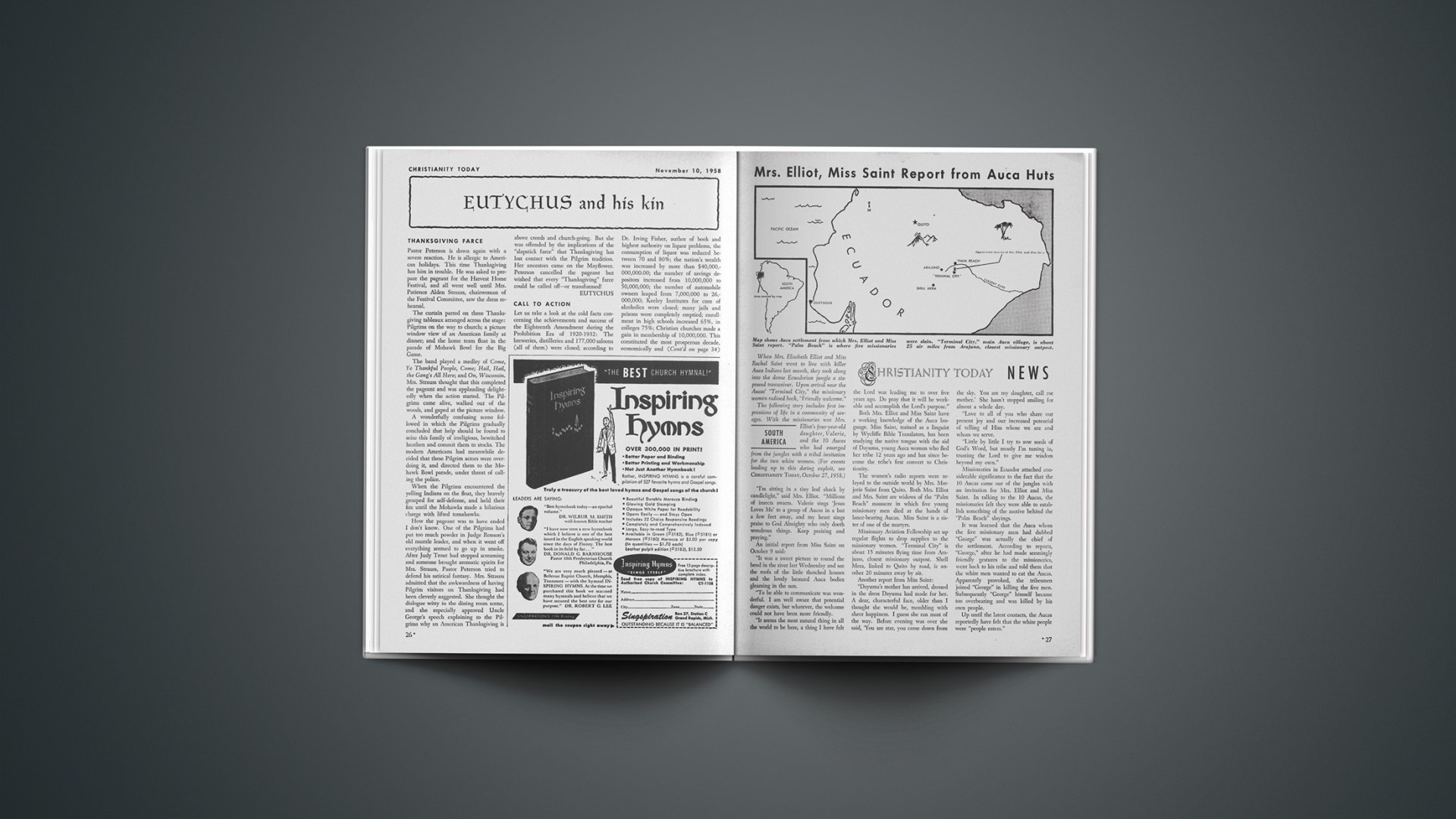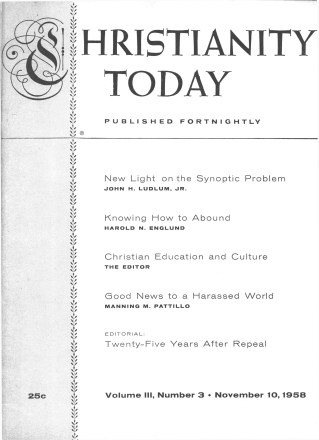CHRISTIANITY TODAY NEWS
When Mrs. Elisabeth Elliot and Miss Rachel Saint went to live with killer Auca Indians last month, they took along into the dense Ecuadorian jungle a six-pound transceiver. Upon arrival near the Aucas’ “Terminal City,” the missionary women radioed back, “Friendly welcome.”
The following story includes first impressions of life in a community of savages. With the missionaries was Mrs. Elliot’s four-year-old daughter, Valerie, and the 10 Aucas who had emerged from the jungles with a tribal invitation for the two white women. (For events leading up to this daring exploit, seeCHRISTIANITY TODAY, October 27, 1958.)
“I’m sitting in a tiny leaf shack by candlelight,” said Mrs. Elliot. “Millions of insects swarm. Valerie sings ‘Jesus Loves Me’ to a group of Aucas in a hut a few feet away, and my heart sings praise to God Almighty who only doeth wondrous things. Keep praising and praying.”
An initial report from Miss Saint on October 9 said:
“It was a sweet picture to round the bend in the river last Wednesday and see the roofs of the little thatched houses and the lovely bronzed Auca bodies gleaming in the sun.
“To be able to communicate was wonderful. I am well aware that potential danger exists, but whatever, the welcome could not have been more friendly.
“It seems the most natural thing in all the world to be here, a thing I have felt the Lord was leading me to over five years ago. Do pray that it will be workable and accomplish the Lord’s purpose.”
Both Mrs. Elliot and Miss Saint have a working knowledge of the Auca language. Miss Saint, trained as a linguist by Wycliffe Bible Translators, has been studying the native tongue with the aid of Dayuma, young Auca woman who fled her tribe 12 years ago and has since become the tribe’s first convert to Christianity.
The women’s radio reports were relayed to the outside world by Mrs. Marjorie Saint from Quito. Both Mrs. Elliot and Mrs. Saint are widows of the “Palm Beach” massacre in which five young missionary men died at the hands of lance-bearing Aucas. Miss Saint is a sister of one of the martyrs.
Missionary Aviation Fellowship set up regular flights to drop supplies to the missionary women. “Terminal City” is about 15 minutes flying time from Arajuno, closest missionary outpost. Shell Mera, linked to Quito by road, is another 20 minutes away by air.
Another report from Miss Saint:
“Dayuma’s mother has arrived, dressed in the dress Dayuma had made for her. A dear, characterful face, older than I thought she would be, trembling with sheer happiness. I guess she ran most of the way. Before evening was over she said, ‘You are star, you came down from the sky. You are my daughter, call me mother.’ She hasn’t stopped smiling for almost a whole day.
“Love to all of you who share our present joy and our increased potential of telling of Him whose we are and whom we serve.
“Little by little I try to sow seeds of God’s Word, but mostly I’m tuning in, trusting the Lord to give me wisdom beyond my own.”
Missionaries in Ecuador attached considerable significance to the fact that the 10 Aucas came out of the jungles with an invitation for Mrs. Elliot and Miss Saint. In talking to the 10 Aucas, the missionaries felt they were able to establish something of the motive behind the “Palm Beach” slayings.
It was learned that the Auca whom the five missionary men had dubbed “George” was actually the chief of the settlement. According to reports, “George,” after he had made seemingly friendly gestures to the missionaries, went back to his tribe and told them that the white men wanted to eat the Aucas. Apparently provoked, the tribesmen joined “George” in killing the five men. Subsequently “George” himself became too overbearing and was killed by his own people.
Up until the latest contacts, the Aucas reportedly have felt that the white people were “people eaters.”










